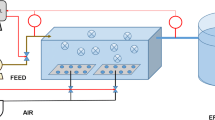Abstract
A rotating biodisc contactor (RBC) was used for biological treatment of synthetic saline wastewater with and without sludge (cell) recycle. Synthetic wastewater composed of diluted molasses, urea, KHzPO4, MgSO4 and 3% salt (NaCl) was fed to the RBC unit with different flow rates. Underflow from a sedimentation tank placed at the end of RBC unit was recycled to the RBC unit with a constant flow rate. COD removal rates and efficiencies were determined for the cases of with and without sludge recycle and compared.
COD removal efficiencies and rates obtained with sludge recycle were higher than those obtained without sludge recycle at low A/Q ratios (high flow rate) because of extra residence time provided by sedimentation tank. However, no significant difference was observed in the performance of RBC with and without sludge recycle at high A/Q ratios (low flow rates).
Because of poor sedimentation characteristics of the culture no significant increase in biomass concentration in the RBC was observed when the system was operated with sludge recycle.
Similar content being viewed by others
Author information
Authors and Affiliations
Additional information
Received: 15 April 1997
Rights and permissions
About this article
Cite this article
Kargi, F., Dincer, A. Effect of sludge recycle on performance of a rotating biodisc contactor treating saline wastewater. Bioprocess Engineering 18, 235–239 (1998). https://doi.org/10.1007/s004490050436
Issue Date:
DOI: https://doi.org/10.1007/s004490050436




